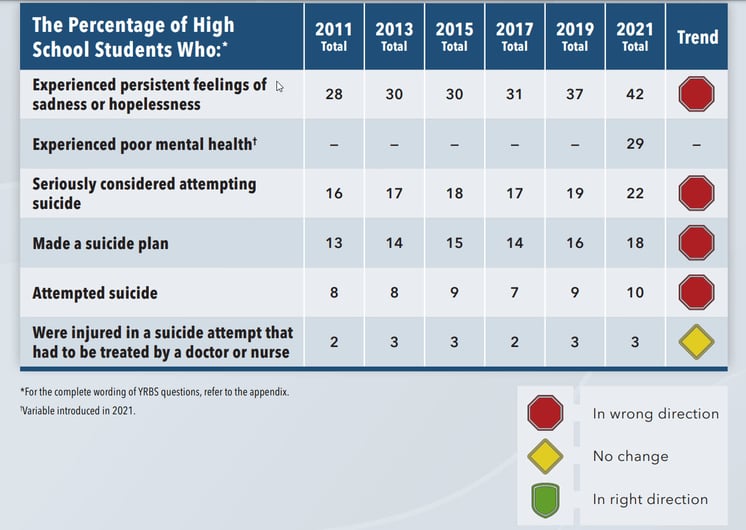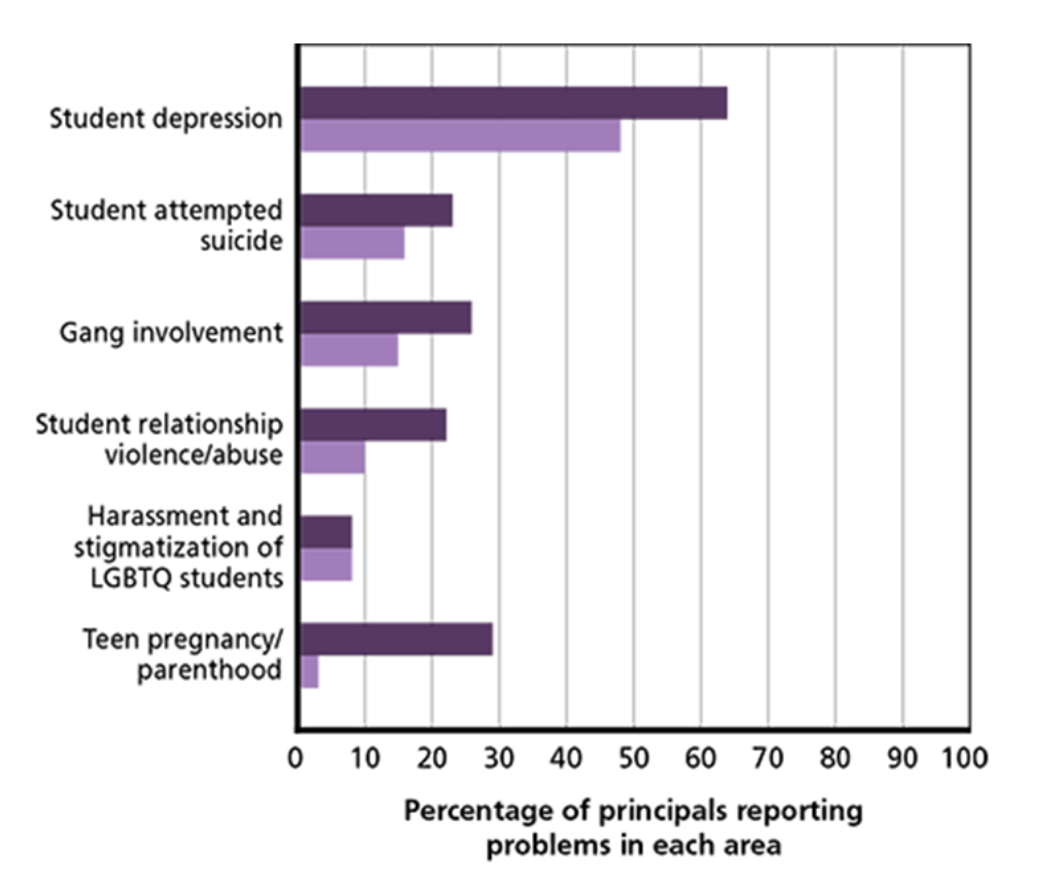The mental health of students has catapulted to the forefront of educational concerns in recent years. Further, the impact of the COVID-19 pandemic has only intensified these concerns, prompting schools to adopt innovative strategies to support their students. Drawing from a wealth of resources, including insights from educators, researchers, and mental health professionals, we explore the multifaceted approach schools are taking to navigate this challenge.
Did you know?
More than 4 in 10 (42%) students felt persistently sad or hopeless and nearly one-third (29%) experienced poor mental health. (CDC)

Mental Health and Suicidality Variables
Understanding the Scope of the Issue
A survey by the American Montessori Society highlights the increasing demand for mental health services in schools, showing a significant rise in students seeking help for depression, anxiety, and trauma. Similarly, USAFacts reports that 76% of public schools have seen an uptick in staff concerns about student mental health since the pandemic began. These statistics underscore the urgent need for effective mental health support within our educational systems.
Strategies for Support
Schools are employing a variety of strategies to address these needs:
- Creating Safe Spaces for Discussion: Harvard Business Publishing Education emphasizes the importance of educators understanding and addressing mental health in the classroom. By fostering open discussions and providing support, schools can create an environment where students feel safe to express their concerns.
- Integrating Holistic Approaches: Schools are increasingly recognizing the importance of addressing the whole child. The American Montessori Society's emphasis on holistic approaches highlights the integration of mental health education into the broader curriculum.
This method fosters an environment where emotional and social development is considered just as crucial as academic achievement. By embedding mental health awareness into daily learning, schools help normalize conversations around mental health, thereby reducing stigma and encouraging students to seek help when needed.
- Implementing Comprehensive Support Programs: The Southern Regional Education Board advocates schools to integrate mental health and wellness programs, highlighting the importance of a holistic approach to student well-being. These programs go beyond addressing immediate mental health issues, aiming to embed wellness practices into students' daily routines. Activities such as mindfulness exercises, stress management workshops, and social-emotional learning (SEL) initiatives help build resilience, teaching students coping mechanisms that support their long-term mental well-being.
- Providing Access to Mental Health Services: According to com, schools can support student mental health by offering services directly on campus, training staff to recognize signs of mental health issues, and creating a culture of support. By offering services like counseling and therapy on campus, schools ensure that help is readily available to students. This approach, coupled with staff training in mental health awareness, ensures that students facing mental health challenges can access the care they need without delay.
- Leveraging Community Resources: Supportive school culture and community involvement speaks to the power of collective action in addressing mental health. By fostering a school environment that values mental well-being, encourages open dialogue, and supports diversity, schools can create a sense of belonging and acceptance. This culture of support empowers students to seek help and supports their overall mental health. It is advisable for schools to enhance mental health support by normalizing mental health discussions, investing in staff training, and fostering a supportive school culture.
- Adopting the Community School Approach: Ed Politics showcases how some schools are a step ahead by using the community school model to address mental health needs, emphasizing the role of schools as community hubs that offer tailored programs and services. The community school model offers a comprehensive framework for addressing student mental health needs. By acting as community hubs, these schools provide a range of programs and services that reflect the needs of their students and families. This approach not only addresses immediate mental health challenges but also tackles underlying issues such as socioeconomic factors, thereby offering a holistic solution to student well-being.
The Impact of a Collaborative Approach: Focusing on Prevention and Early Intervention
Research from RAND Corporation, a globally renowned nonprofit research organization illustrates the effectiveness of prevention and early intervention activities in schools, highlighting the positive outcomes of addressing mental health proactively. These efforts not only improve the mental health of students but also contribute to a more positive and inclusive school environment.

Source: RAND
Schools that implement programs aimed at early detection and intervention can significantly reduce the incidence of severe mental health issues. These initiatives, ranging from peer support groups to social-emotional learning (SEL) curriculums, help to create a supportive environment where students feel comfortable sharing their struggles.
Moving Forward
The collective insights paint a picture of a dynamic and evolving landscape where schools are increasingly recognized as vital partners in supporting student mental health. By adopting a multifaceted approach that includes creating safe spaces, providing direct and prompt services, leveraging community resources, and fostering a culture of support, schools can make a significant impact on the well-being of their students.
As we continue to navigate the challenges posed by the mental health crisis among students, the examples and strategies outlined in this blog offer valuable guidance for schools looking to enhance their support systems and ensure that all students get the opportunity to thrive both academically and emotionally.
Kokomo24/7® is a leader in health and safety compliance and risk management, offering Kokomo24/7® WELLNESS™, a comprehensive K-12 schools telehealth software designed to cultivate a culture of health and wellness within schools. Since its inception in 2018, Kokomo24/7® has distinguished itself by serving a broad spectrum of clients, including Fortune 1000 companies and notable public-sector organizations such as Chicago Public Schools. Ask us about the time we helped host the Oscars!

 CASES™
CASES™ ESCALATE™
ESCALATE™ TRIAGE™
TRIAGE™ NOTIFY™
NOTIFY™ FORMS™
FORMS™ ANALYTICS™
ANALYTICS™ HOST™
HOST™ OWLPASS®
OWLPASS® ACCESS™
ACCESS™ WELLNESS™
WELLNESS™ CONNECT™
CONNECT™ CREDENTIALS™
CREDENTIALS™





